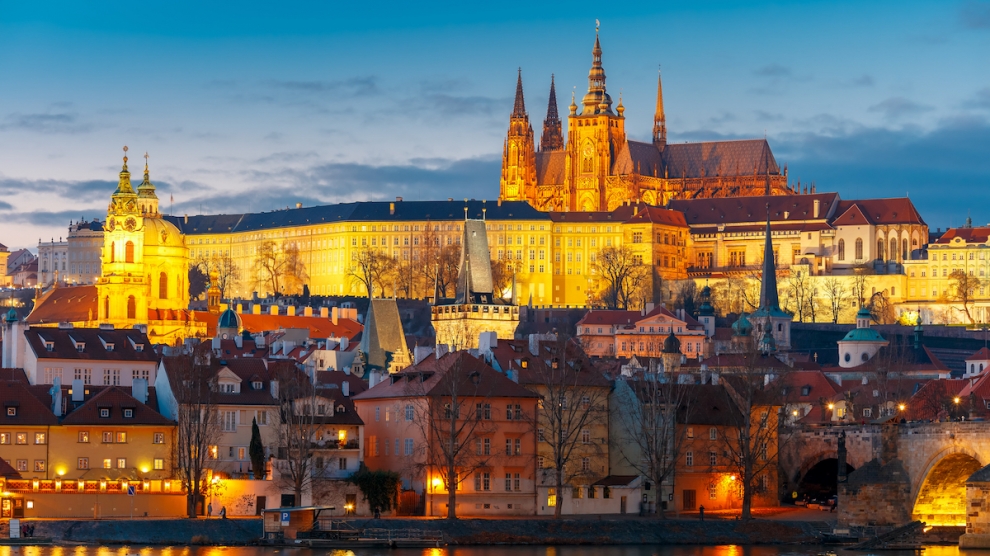The evils of mankind are caused, not by the primary aggressiveness of individuals, but by their self-transcending identification with groups whose common denominator is low intelligence and high emotionality.
— Arthur Koestler, born in1905
Richard Fidler and the magical lure of golden city of spires- Prague
Richard Fidler’s new book The Golden Maze is a biography of Prague, which features all the significant characters and events from Czech history – reformers, recalcitrants, artists and revolutionaries. Figures including kings Wenceslas and Charles IV, theologian Jan Hus, the German astronomer Johannes Kepler, Emperor Rudolf II, Empress Maria Theresa, composer Bedrich Smetana, tragic activist Jan Palach, and politicians Tomas Masaryk, Jan Masaryk, Dubcek and, of course, Vaclav Havel.
The magical lure of Prague: Elsewhere in emerging Europe
Richard Fidler releases new book on history of Prague
Richard Fidler on the glorious and grotesque history of Prague
In The Golden Maze, Richard Fidler covers acres of rich ...
Richard Fidler's Prague - Conversations - ABC Radio
Prague's Second Spring | ABCtales
Cold river : the cold truth of freedom / Jozef Imrich. - Trove
We Don’t Know How to Warn You Any Harder. America is Dying.
Umair Haque, Medium. “We survivors of authoritarianism have a terrible,
terrible foreboding, because we are experiencing something we should
never do: deja vu.”
Before Vaclav Havel’s imprisonment, the Czechoslovak secret police followed and
watched his every move. The secret police occupied a property next to
his house and built a watchtower on it, from which they observed him at
all times and even while he walked his dog. These led to many
dissidents escape into exiles, but Havel and a handful of others refused
to budge. Havel was later sentenced to long term in prison with hard labor, welding metal gratings and stripping insulation from wires.
Havel said that the work “wasn’t too bad, as long as he could get used
to the cold and endless filth”. However, when he failed to finish his
work, he would be punished with reduced rations. Havel and other
prisoners were also beaten and threatened with execution; he suffered
from pneumonia because of his exposure to cold and would have died if he
had stayed longer in prison. He was released as a direct result of
international pressure
——
On Fidler’s ABC: Nazism, socialism and the falsification of history
The Story of Fascism is an hour-long TV special from travel guru Rick Steves about the history of fascism in Europe, from its post-WWI rise in Italy and Germany to the defeat of the fascist powers in WWII to efforts by modern-day right-wing ideologues to revive it.
We’ll trace fascism’s history from its roots in the turbulent aftermath of World War I, when masses of angry people rose up, to the rise of charismatic leaders who manipulated that anger, the totalitarian societies they built, and the brutal measures they used to enforce their ideology. We’ll see the horrific consequences: genocide and total war.
Because Steves hosts a travel show, they visit some of the places where this history played out, including Nuremberg, Auschwitz, and Rome, talk to historians and tour guides, and discuss fascist and anti-fascist art, including Picasso’s Guernica.
The combination of the weighty subject matter and Steves’ jaunty TV voice is a bit jarring at first, but this packs a lot of information and context into an hour. There are obviously parallels throughout to contemporary leaders and their tactics, but check out Benito Mussolini’s mannerisms and facial expressions starting at 11:05 and see if they remind you of the current inhabitant of the White House.
Trump loved Putin, Cohen wrote, because the Russian leader had the ability "to take over an entire nation and run it like it was his personal company – like the Trump Organisation, in fact."
TRUMP A 'CHEAT' WHO IDOLISED PUTIN, MOCKED NELSON MANDELA: COHEN BOOK
